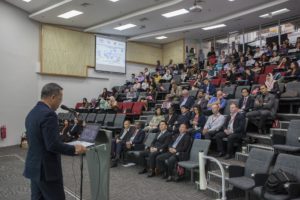2019 APEC CoE Pilot Training on Supply Chain Security for Medical Products
Background
In early 2018, at a meeting between the Senior Director of Pharmaceutical Services, Ministry of Health Malaysia and the Heads of the Schools of Pharmacy in Malaysia, it was announced that APEC-LSIF was interested in setting up a Centre of Excellence (COE) for Supply Chain Security in the Asian region.
As Taylor’s University was already conducting training for regulators and industry, it was decided to explore this possibility of a COE at Taylor’s University.
A delegate from Taylor’s University attended the 2018 APEC Harmonization Center Global Supply Chain Integrity Training (Pre-Center of Excellence Training) from 28th August to 30th August at Seoul, Korea, and was exposed to the excellent work in the APEC Roadmap Project and the Supply Chain Security Toolkit.
After the training, Taylor’s University submitted an application to be an APEC-COE for Pilot Training and this application was successful and Taylor’s University was endorsed by APEC-Life Sciences Innovation Forum) (LSIF) as an APEC-LSIF RHSC Training Center of Excellence for Regulatory Science pilot training for Supply Chain Integrity in March 2019.
A PWA COE Program Committee was set up and a teleconference was held on 3rd June 2019 and it was agreed that the training would focus on three areas of Good Distribution Practice (GDP), Track and Trace (T&T) and Internet Sales. Members of the program committee were happy with the draft program and suggested small group discussion instead of a forum for the 3rd day.
Pilot Training
The training was conducted at Taylor’s University from Sept 25 to 27, 2019. It was opened by Dr Ramli Zainal, Senior Director of Pharmaceutical Services, Ministry of Health and the closing ceremony was officiated by Mr Fabian Bigar, Under-Secretary, Policy and International Relations Division, Ministry of Health Malaysia.

All the presentations for the training were conducted at one of the lecture theatres (LT12) and the small group discussions were conducted in the X-Space classrooms. Language used was English.
For small group discussions the participants were divided into five groups and each group had a leader/rapporteur. The leaders were from different member economies and included the Philippines, Papua New Guinea, Korea and Malaysia.
The program also included a site visit to the warehouse of Zuellig Pharma where the participants could see some of the details of GDP and Track and Trace that were discussed/presented during the training.
Speakers
There was a good mix of speakers from different sectors. There was a total of 16 speakers, four from the Ministry of Health Malaysia, three from governmental organizations of other member economies, six from industry, one was an academic at Taylor’s University and two from non-profit, non- governmental agencies. All the speakers were experts in their area and the participants were appreciative of the expertise at the training.
For a full list of speakers and their backgrounds click here
Participants
There was a total of 99 participants. Most of the participants (78) were from Malaysia and they included regulators and others from the industry who worked in regulatory affairs and in logistics, including supply chain. The remaining 21 participants (mostly regulators) were from Singapore, Indonesia, Philippines, Papua New Guinea, Korea, Thailand, Vietnam and Chinese Taipei
Evaluation by participants
We received completed evaluation forms from 59 participants and two speakers. All the participants had positive things to say about the program and all indicated an increase in knowledge from before attending the training. The overall feedback was based on six positive statements (e.g. The content was well organized and easy to understand) and the participants had to respond on a scale of 1 – 7, whether they strongly disagreed (1) or strongly agreed to the statements.
The overall average was 5.9/7 which indicated that participants were generally satisfied with the training. The regulators and foreign participants (who were also mainly regulators) gave an average of 6.0/7 and the industry participants gave an average of 5.8/7.
This probably indicates that for the regulators (mainly Malaysian) and the foreign participants (mainly from APEC economies), the material on T&T and Internet Sales were relatively new and they found it more useful. Most of the Asean member economies are at the early stages of planning for the regulation of these areas.
Participants comments in the evaluation forms
- Commendations Organizing committee are good, Job well done!
- Great job! Great venue and affordable charges
- Good to have hard copy and soft copy of the notes
- Very well organized and very good hospitality, food etc.
- Blessed to have international exposure though working locally
- Good to have NPRA and industry experts as speakers All presentations by industry was useful. As a government officer, I can understand their point of view.
- Very well organized and informative. Overall good training.
- We have heard about T&T, but not much information. With the involvement of the Ministry of Health in the training, we can plan better for what is coming.
- Internet Sales was new knowledge
- Enjoyed the site visit. Very informative training. Overall, I thought the support and encouragement of Taylors University staff and the organizing committee were excellent

Suggestions for future training
- There should be more panel discussion
- Program evaluation should be online
- More in-depth training for GDP
- GDP in action
- More sharing and small group discussion
- More case studies and experience of other member economies
- Longer presentation time for speakers and with time for Q & A
- Try to use mobile app “slido” for participants to ask questions, in case some are shy to ask questions in public
- Hope to see more ASEAN/APEC participation to understand their view of the road map for their member economy and also to understand their take on harmonization to regional/global standards
Topics for future:
>Digitalization and IOT in Supply Chain Management
>Computerized System Validation (CSV) application in GxPs from other member economies/companies
Suggestions by speakers
- Useful discussion that focused on what actions/efforts other regulators are taking to address issues of supply chain security and where possible, address current strengths and areas of unmet needs
- In the future could look at other areas in the toolkit – updated, current modules, perhaps combined modules focusing more on current issues, current trends and current needs that lead to action. Not sure if the toolkit was leveraged enough or highlighted thus maximizing the effort put into the program or resources expended. Some presentations were not addressing current issues or need but more theoretical making it difficult to drive any actions …. more action-oriented focus?
- Having industry and regulators interact is useful but I wonder if dialog would be more open if industry attendance was more limited to speakers, allowing a bigger regulator focus (greater regulator presence) and more open dialog discussing issues, pain points, and areas of potential cooperation/collaboration. Perhaps have a regulator only session? (within the course of the training). I liked the interaction on internet sales. I was extremely impressed with the Malaysia and Singapore internet sales presentations.
- I thought the MOH Malaysia presentations were all excellent. The case study split out groups were excellent I think it is important to decide on which areas of the supply chain roadmap and which toolkits will be the focus for future training programs. 10 toolkits is too many and perhaps some should be eliminated or combined. Also, many toolkits need to be updated. Once a decision I reached on focus, then future training should be more interactive with focus on implementation of the toolkits
- For the future an update internet sales toolkit and ways for government and private sector to work together. Cyber security and cooperation in investigations to take down illegal websites selling drugs is an important focus.
Reasons for the successful conduct of the training
- Strong support from the Ministry of Health Malaysia and the National Pharmaceutical Regulatory Agency from the early stages was very helpful. The Senior Director of Pharmaceutical Services personally chaired a meeting and committed the full support of the Ministry of Health and undertook to encourage the support of the industry for the training. Staff from the Policy and Internationals Relations Division of the Ministry of Health Malaysia attended the SOM meeting in Chile and made the presentation on behalf of Taylor’s University
- Support from the industry associations – PhAMA representing primarily the multinational companies, MOPI representing primarily the local manufacturers and MAPS representing the Importers and Distributors of generic products.
- Strong support from speakers from key industry, governmental and non-governmental agencies who readily accepted our invitation. A lead was appointed for each of the three areas and the leads coordinated in an excellent manner with the speakers in each area to ensure adequate coverage and also to avoid redundancy. The speakers were very knowledgeable in their area of expertise and the participants benefitted from the active question and answer sessions that followed most of the presentation.
- The support from AHC in providing guidance during the planning and in many ways was very beneficial. In addition, they provided support for the travel and accommodation of two speakers and 11 participants from APEC supported economies.
- A very good and strong organizing committee who worked hard and efficiently to ensure everything was carried out as planned. The support and encouragement of the university to facilitate the training was also an important factor
